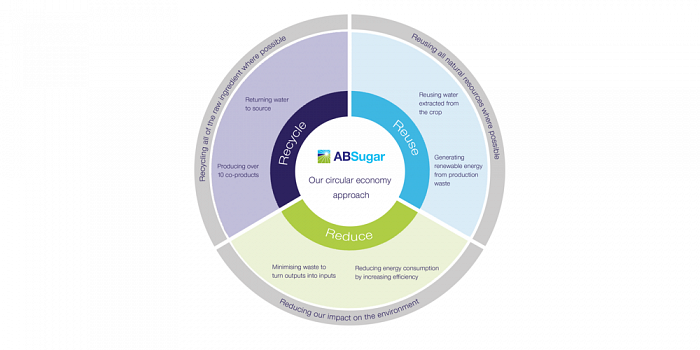4 July 2018
More than sugar - AB Sugar’s Circular Economy
All of our sugar businesses adopt a circular economy approach – to make the most out of every stick of cane and root of beet so that wherever possible there is minimal waste by producing co-products, generating renewable energy and reusing or returning water to source. This not only helps us contribute to our sustainability ambitions and those of our customers but also provide additional value for the business through commercialising downstream products made from our waste.
While the overall goal is the same, our businesses all take different approaches to maximise every opportunity to produce value and reduce our environmental impact.
- AB Sugar China - Despite operating in a remote area with limited waste infrastructure, AB Sugar China has nonetheless made significant strides in moving to a more circular economy. Its sites now recycle nearly 50% of their waste and they also sell co-products, like molasses and animal feed as well as ash from their boilers which they use to supply factories to make bricks.
- Azucarera - Azucarera recycles 99% of waste from the sugar process and produces around 400,000 tonnes per year of co-products like animal feed and agricultural fertiliser. For the former, Azucarera can provide bespoke feed products tailored to the need of its customers. To decrease emissions in producing animal feed, they introduced a sun-drying pulp system instead of using mechanical dryers which reduces CO2 emissions by 13,000 tonnes per year at its factories.
- British Sugar - British Sugar makes over ten different co-products from the sugar making process, including animal feed, LimeX and topsoil – the non-core sales for which deliver approximately 21% of total revenue. Across their four factories, they produce less than 200 grams of waste per tonne of sugar produced. In Bury St Edmunds, they use an Anaerobic Digester to turn over 97,500 tonnes of beet pulp per year into enough energy to power over 18,000 homes. In our Wissington operations, we run an 18 hectare glasshouse which uses 46,000 MWh of excess heat from the factory and 250,000 tonnes of CO2 for horticulture.
- Illovo Sugar Africa - Illovo uses the bagasse, the residue left after sugar cane crushing, to produce its own renewable energy which is the main contributor to 86% of the Group’s energy consumption coming from renewable sources. However they also produce high-value downstream co-products derived from the sugar making process. These include ethanol, pesticides, fertiliser, and ingredients for flavouring.
In 2018, this approach gained international recognition when it was awarded the ‘Reduce, Reuse, Recycle' award from the Global Good Awards whose judges were impressed by our businesses’ holistic and innovative approach to reducing waste.
"The judging panel noted, in particular, how [AB Sugar] demonstrated a clear commitment to finding a creative solution to deliver resource efficiency by developing and implementing a holistic approach, which required significant financial investment, and a wholehearted belief in the environmental business case. The winning entry was also praised for its “very clear measured outcomes”, and “impressive education work up and down the supply chain”. Global Good Awards, 2018[1]
Much of this work above represents substantial investment for over a decade to extract the maximum value from sugar cane and sugar beet while minimising our environmental impact.
We recognise there is still more that can be done to not only bring all our businesses closer to a completely circular economy but to also help reach our newly announced commitments to reduce both our CO2 and water footprints by 30% across the end-to-end supply chain by 2030 as well as ensure all our plastic packaging is reusable, recyclable, biodegradable or compostable.
These ambitious commitments follow decades of work to create a circular economy and we intend to use this experience to inspire our continuous drive for greater efficiency, embracing new technology and harvesting innovation to achieve our 2030 ambitions.












